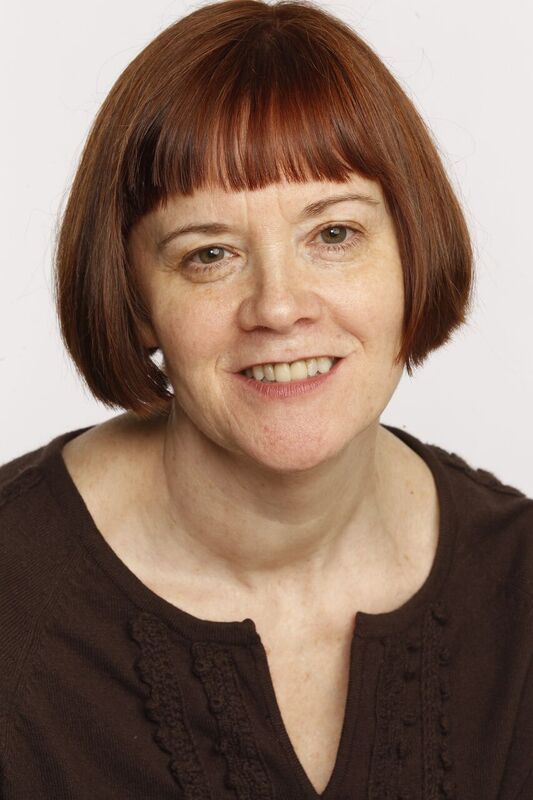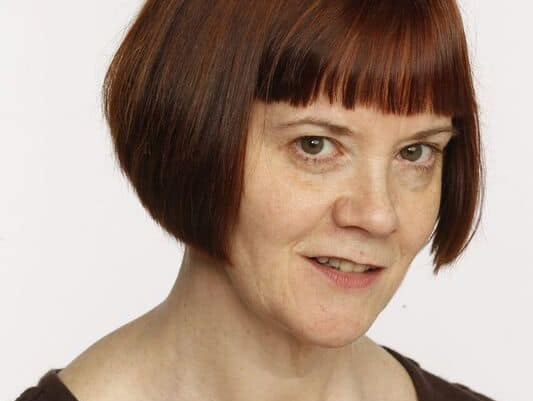By: Linda Armstrong
March is Women’s History Month and it is a time when women who paved the way are recognized for their accomplishments. Dessie Moynihan is the perfect person to recognize as she changed the face of senior management at the Shubert Organization in 2006 when she became the first woman to be named a vice president. “I’ve seen Shubert grow from a very private company that had been family run to a multifaceted corporate organization. As time went on there was another female vice president appointed–in Human Resources–and in the past 5 years a number of women have risen to the director level, which is really great. I see a change in the world and I see a change at the company. Leadership has embraced it, so it’s not as singular as it once was,” Moynihan explained.
Reflecting on her responsibilities as Vice President of Creative Projects, Moynihan stated, “My department looks for material for Shubert to produce, invest in and book into our theatres. Part of that is putting money into plays and musicals that other people are producing. Part is thinking about what should go into our Broadway houses. Part of it—the really fun part—is being in a project from the very beginning and seeing it through to opening. Right now with Neil Meron we’re developing the new musical ‘Some Like It Hot’ by Matthew López, Amber Ruffin, Marc Shaiman & Scott Wittman, directed & choregraphed by Casey Nicholaw. It’s been a delight. And I’m lucky enough to work with Bob Wankel, our Chairman and CEO, on both bookings and productions.”
Breaking down the booking process, Moynihan explained, “We keep up with what is going on in theatre in New York, across the country and around the world. We go to London to have meetings and see shows. Most of my interaction is with the producer. He or she will say, ‘I have this new musical, I’m doing a reading and I’d love for you to come see it and give us a theatre.’ There’s a long list of productions that want to play Broadway but the list of available theatres is short and has been for several years. It’s complicated by the fact that some shows have been quite successful and they take their theatre ‘off the market’ for a long time: ‘Phantom of the Opera’ has been playing for over 30 years, ‘Chicago’ over 20, and there are several other long-runners. In our smaller theatres we tend to book limited-engagement plays. If we know a show will run for 16 weeks, we can book a second show for the same season. Overall it’s a complicated puzzle with many factors, including making sure we have our houses lit, that we give new producers a chance and that we host a diverse range of material and voices.”

The Shubert Organization owns and operates 17 Broadway theatres, but its profits go the Shubert Foundation, a charitable organization. Since its establishment in 1977, the Foundation has awarded over $505 million to not-for-profit theatres, dance companies, educational institutions and arts-related organizations throughout the United States. Last year, $32 million was awarded to 560 performing arts organizations. “One of our priorities at the Shubert Organization is to ensure that we can contribute to the fantastic work the Foundation is doing, especially in this time when so many non-profit companies will be in such dire straits.”
The pandemic has definitely affected Moynihan’s work. “Every company, every person in the industry has been impacted by this. Shubert’s income was drastically reduced. We own Telecharge, but for the past year very few people have been buying tickets. We had to make severe cuts. My routine is very different. Not being able to go to readings, workshops and productions has been difficult. I watch things online, but it’s just not the same experience. I check in with producers to see if their plans have changed and how their shows are progressing. With our own projects, like ‘Some Like It Hot,’ we are proceeding with the development process.
The focus for everyone right now is the future,” Moynihan remarked. “Communication with our audience is going to be even more important. New Yorkers will be there right at the start, then domestic tourists and then international travelers. It’s impossible to predict exactly what people will want to see when this is over. But I think it will need to make a statement, to speak to the truth of being a human being or to be terrific entertainment. Hopefully there are shows that do all those things! I think that’s what people are craving–to be moved, to laugh, to be brought to tears.”
“The thing that’s great about Broadway is that it really is a community. Even though there is competition among producers and creatives, there is a feeling, especially with the Broadway League, that we’re all in this together. I’m hoping that when we relaunch, there is going to be a burst of excitement and we can get back onto the regular Broadway season with the Tony Awards in June. Having been through this weird year, everyone is feeling, yes, there is a way forward,” Moynihan declared.
Moynihan’s path to where she is today was an interesting one. While growing up in Manchester, New Hampshire she didn’t get bitten by the theatre bug until she was a member of the Drama Club in High School. Her theatre teacher told her if she wanted to do theatre, she needed to go to Hunter College in New York City. She only applied to Hunter, got in, headed for New York City without knowing anyone. “It was 1973. I got a room at a YWCA on the East Side,” she recalled. She left New York the next year, but came back for graduate school, receiving her M.A. in Drama and Dance and a Ph.D. in Performance Studies from NYU. “They were academic degrees, as opposed to acting and directing. But they gave me a knowledge of the history of the craft. I learned how the discipline evolved. If someone said ‘I want to do a Brecht play,’ I knew who Brecht was and his theories,” Moynihan explained. “I was also an Assistant Editor at ‘The Drama Review,’ a quarterly publication, and that trained me in the ways to think about performance and write about it.”
While at NYU she worked at Circle Repertory Company in the PR/Marketing department, headed by Richard Frankel, who would go on to be a Broadway producer and general manager. “PR is a very high pressure environment and I learned an incredible amount about the process. Because of that I was then able to get a job at Ensemble Studio Theatre, again in marketing. It was a smaller organization; there weren’t walls between departments. I was able to move from Marketing to Literary, where I felt most comfortable. As Literary Manager I worked with member artists who were creating projects and assisted Artistic Director Curt Dempster with developing shows for the main stage. That was one more piece of the puzzle that was helpful when I got to Shubert,” Moynihan said.

From 1988 to 1995 Moynihan worked at The Shubert Foundation, starting as the Program Assistant processing applications and eventually moving up to Program Director, where her responsibilities included meeting with applicants, seeing productions, and preparing material for Executive Director Vicki Reiss. Being a multi-tasker, Moynihan also taught theatre history and dramaturgy for the first five years of her time with the Shubert Foundation.
The Shubert Foundation proved to be vital groundwork for Moynihan to move forward. “It was from the Foundation, getting to know all of those theatres across the country and what they were doing, that made for a natural transition to the creative side. In 1988, the landscape of the American theatre was very different from what it is today. Non-profits usually didn’t take their work to Broadway themselves. If a show was successful, a commercial producer would come by and move it. ‘A Chorus Line’ changed all that. It originated at The Public Theatre; but instead of giving it to someone else, the Public raised the money and moved it to Broadway. It was a risk but it turned out to be a giant hit. And it demonstrated a theatre could produce a show commercially, retain artistic control and have money flow back to nurture the core mission. So suddenly there was a ton of new work being generated by theatres across the country. At Shubert, there wasn’t a department dedicated to tracking that or looking for material for us to produce ourselves. I was in the right place at the right time. Because I was at the Foundation, worked in non-profit theatre and had the educational background, I was the person who was selected to start Creative Projects department in 1996,” Moynihan recalled.
Moynihan commented, “I had no idea what my future would be. I didn’t have a strategy. I am amazed that my path has been such a wonderful journey. I’m just one of the luckiest people in the world. I am incredibly grateful to the people who helped me and pushed me and gave me opportunities: Richard, Vicki, Bob, Curt, Jerry Schoenfeld, Bernie Jacobs, Phil Smith. I owe them–and many more–a great deal.”
Speaking to young women who want to be a part of the theatre industry, she said, “There are places for you. The most important thing is to seize every single opportunity. Every networking event—do it. Contact someone and say, ‘I heard you speak on a panel, can we have coffee or can I talk to you for 10 minutes?’ Find a company, a production, a play that speaks to you and try to meet the people behind it. I’ve found that people are usually very generous about sharing their advice and experience because someone helped them. Be prepared. Put your best foot forward. Connect in any way you can. Because you never know where that connection is going to lead.”
Linda Armstrong is a theatre critic with the New York Amsterdam News, Theatre Editor for Neworldreview.net, A&E Editor for Harlem News Group and has written for Playbill Online, had a Theatre column “On The Aisle” for Our Time Press, Network Journal Magazine, Show Business Weekly Newspaper, Headliner Magazine, Theatre Week Magazine, Black Masks Magazine, and The New York Daily News.
